Introduction: The Morally Ordinary and the Morally Extraordinary Part I: Heroes, Saints, and Supererogation within the Context of a Duty-Based Morality 1. Supererogation, Optional Morality, and the Importance of J.O. Urmson and David Heyd in the History of Ethics The Advent of the Concept of Supererogation in Contemporary Ethics Urmson's Heroes and Saints: Moral Exemplars without Moral Authority From Urmson to Heyd: Standardizing Supererogation 2. The Standard View under Critical Scrutiny Urmson and Heyd Contested A Duty to Go beyond the Call of Duty? Part II: Morally Extraordinary Persons 3. Ordinary Human Heroes The "Hero" as a Type Heroic Representations Human Heroes Characterizing Heroes within a Moral Framework 4. Suffering Saints Eccentrics or Exemplars? Following in the Footsteps of Martin Luther King, Jr. and Dorothy Day: The Case of Two Modern Saints Saints and the "Ethics of Excess" Saints and Supererogation Part III: Ordinary Persons and Moral Development 5. Moral Development, Obligation, and Supererogation The Thesis of Moral Development Aristotle and the Grounds for the Aretaic Meta-Duty Psychological Realism and the Thesis of Moral Development Criticisms and Responses 6. Human Striving and Creative Justice The Thesis of Moral Development and the Religious Thought of Abraham Heschel and Paul Tillich Conclusion Bibliography Index

